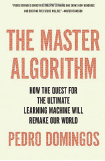BOOKMARK
Title: The Master Algorithm: How the Quest for the Ultimate Learning Machine Will Remake Our World
Author: Pedro Domingos
Publisher: Beacon Press
Publication date: February 2017
Price: $24.95, hardcover, 288 pages

Technology is revolutionizing our understanding and treatment of diseases. Machine learning and big data have become the wave of the future in science and medicine. For instance, ASCO’s CancerLinQ™ harnesses real-world cancer data from electronic sources and provides quality feedback to oncologists, who in turn use that data to help them personalize their patient care. Big data and learning machines are on track to become the ultimate tool for the world’s top research labs and medical institutions.
However, this brave and bold new way forward is still shrouded in technomystery to many in health care. A new book called The Master Algorithm: How the Quest for the Ultimate Learning Machine Will Remake Our World assembles a highly readable, step-by-step blueprint for understanding this invaluable computational tool. The author, Pedro Domingos, Professor of Computer Science at the University of Washington and a fellow of the Association for the Advancement of Artificial Intelligence, has accomplished what many scientists have failed to do: take a highly complex subject and reduce it into a good read, a page-turner in fact. The book is organized into 10 chapters, with well-placed subheads that neatly break up long sections of narrative.
A Knack for Analogy
Only a generation ago, the word algorithm usually drew a blank stare. Today, algorithms are woven into the fabric of society. That said, as the author points out, the term might be familiar, but many still cannot define it. In simple terms, an algorithm is a sequence of instructions telling a computer what to do. In machine learning, each algorithm learns from its predecessor. Not surprising, Mr. Domingos warms up the reader with a nuts-and-bolts rendition of algorithms and machine learning.
He has a knack for spot-on analogy, noting that in the information-processing ecosystem, machine learners are the superpredators, and databases are the herbivores. He writes: “Databases, like elephants, are big and heavy and never forget. Among these patient beasts dart statistical and analytical algorithms, compacting and selecting, turning data into information. Learners eat up this information, digest it, and turn it into knowledge.” According to the author, if every algorithm suddenly stopped working, it would be the end of the world, as we know it.
Focus on Cancer
The author delves into cancer several times, noting that machine learning and algorithms coupled with our knowledge of the human genome can help develop simulations about how the cancer cell works, enabling us to simulate on a computer model the effect of a specific patient’s mutations as well as the effect of different combination targeted drugs. He notes: “A cancer drug must disrupt cancer cells’ workings without interfering with normal ones. If we have an accurate relational model of both, we can try many different drugs in silico, letting the model infer their good and bad effects and keeping only the best ones to try in vitro and finally in vivo.”
The ASCO Post readers will especially enjoy a subhead in chapter nine called, “The Doctor Will See You Now,” in which the author begins: “The cure for cancer is a program that inputs the cancer’s genome and outputs the drug to kill it.” The oncology community not only embraces that concept, but also is ahead of the curve. However, the author develops a futuristic program—one that could only have been built with machine learning—that will know every cell pathway, regulatory mechanism, chemical reaction, and tumor mutations—in effect all the ingredients needed to develop drugs that will kill the cancer. He ends on an enthusiastic note: Algorithms will cure cancer.
Minor Criticisms
At times, The Master Algorithm delves too deeply into philosophical musings over, among others, Bayes’ theorem and Newtonian determinism, perhaps giving a small headache to readers who prefer to stick to the value of algorithms in today’s world and hope to find answers to difficult questions buried under mountains of dense data. Others, however, will find these intellectual digressions stimulating. Make no mistake: This book, as fine a read as it is, takes work and is not for readers unacquainted with heady science writing.
Mr. Domingos is a brilliant computer scientist who has written a valuable book. But he’s not an oncologist, and at times, he treads a bit too heavily into the difficult world of cancer. But that’s a small gripe. This book is recommended for The ASCO Post readers. ■

